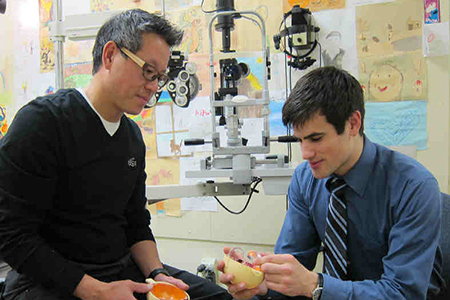IT’S CALLED “BIG DATA” and thanks to advancing technologies (e.g. online banking social media smartphones and satellites) it’s only getting bigger.
Part statistics part computer engineering with a smidgeon of marketing and psychology big data is a field in which information is analyzed and then explained in layperson’s terms to those who make the decisions based on the collected data. How do supermarkets know what music to play at 3 p.m. on Sunday to appeal to the majority of shoppers? How do restaurants know what font will make patrons hungrier? How do cities calculate electric usage to better predict power consumption? That’s where big data experts come in. And with 90 percent of existing data having been created in the last two years alone* you can understand that the need for these number-crunchers and analysts is only going to grow. According to a report by the McKinsey Global Institute by 2018 the United States could face a shortage of 140,000 to 190,000 people with deep analytical skills. To meet demand the number of graduates with skills handling big data will need to increase by as much as 60 percent.
If you think analyzing data and applying the results to business sounds fun here are a few schools that offer big data programs:
• The University of Tennessee’s College of Business Administration (http://bus.utk.edu) offers both undergraduate and graduate programs in business analytics: a Bachelor of Science a Master of Science and a dual degree Master of Science and Master of Business Analytics. The school is seeing 100 percent job offer rates for their graduating seniors––many of whom are being courted before they’re handed a diploma. The icing on the cake? Some graduates’ starting salaries are more than $70,000 at companies like Amazon.com Google Kroger and Caterpillar.
• Because it’s nestled in the Silicon Valley students who attend the University of California San Francisco (www.ucsf.edu) have access to some of the tech masters of the trade for internships. For those looking to prove their knowledge to prospective employers the school offers a data mining certificate.
• The Illinois Institute of Technology (www.iit.edu) offers two Bachelor of Science degrees related to big data: one in computer science with a specialization in data science and one in computer information systems with a specialization in data science.
• At George Mason University (VA) (www.gmu.edu) students can get specific with a graduate certificate in “Data-Driven Decision-Making for Continuous Educational Improvement.”
• The first undergraduate data science degree was offered by the College of Charleston (www.cofc.edu) which helps explain why its data science graduates obtain high starting salaries. Students majoring in data science can choose from 12 cognates including customer relationship management e-commerce geoinformatics molecular biology and psychology to name a few.
But it’s important to note that if you think a degree related to big data guarantees you’ll always be behind the scenes you’re forgetting that soft skills––like communication and public speaking––matter too. After all you’re going to need to share your findings at some point! As Dave Clark a University of Tennessee alumnus who went on to become the vice president of North American Fulfillment for Amazon.com says “People who can do high-level math are practically a commodity. … Those who can communicate effectively the answer in such a way that managers can understand … priceless.”
*SOURCE: www.ibm.com



